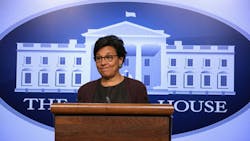Newly Minted 'Manufacturing Communities' to Share $1 Billion
U.S. Secretary of Commerce Penny Pritzker today announced the second set of 12 communities that have received designations under the Obama Administration’s Investing in Manufacturing Communities Partnership (IMCP) initiative. She announced the designees during remarks at the U.S. Manufacturing Summit at Walmart’s headquarters in Bentonville, Ark.
In May 2014, Secretary Pritzker announced the first 12 communities to receive the designation under this U.S. Commerce Department-led program, which is designed to accelerate the resurgence of manufacturing in communities nationwide by supporting the development of long-term economic development strategies.
“An IMCP designation is an important signal to potential investors that these communities are a good place to spend their money, and this is smart government at work," said Secretary Pritzker. “By breaking down silos and encouraging communities to take a more thoughtful, comprehensive approach to their strategic plans, we are ensuring that precious federal dollars are used on the most high impact projects and in a way that maximizes return on investment.”
From the communities that applied this round, 12 were selected by an interagency panel, based on the strength of their economic development plans, the potential for impact in their communities and the depths of their partnerships across the public and private sectors to carry out their plans. Leaders from the private sector, local government, higher education, local economic development organizations, and other nonprofits worked together to identify a sector of manufacturing where their community has a comparative advantage and drafted a strategic plan that addresses: workforce and supply chain challenges; infrastructure; research and innovation; trade and investment; capital access; and operational improvement for manufacturing companies.
The 12 Manufacturing Communities announced today include:
- The Greater Pittsburgh Metals Manufacturing Community led by Catalyst Connection in Pittsburgh, PA.
- The Alamo Manufacturing Partnership, led by the University of Texas at San Antonio in the San Antonio, TX metro area.
- The Louisiana Chemical Corridor led by Louisiana State University, stretching from New Orleans, LA to Baton Rouge, LA.
- The Madison Regional Economic Partnership (MadREP) in the Madison, WI region.
- The Made in the Mid-South Manufacturing Alliance led by the Greater Memphis Chamber spanning five counties in surrounding Memphis, TN.
- The Greater Peoria Economic Development Council leading a five county region in central Illinois.
- The Minnesota Medical Manufacturing Partnership led by GREATER MSP in Minneapolis, MN.
- The South Central Idaho Region led by the Region IV Development Association in Twin Falls, ID.
- The Utah Advanced Materials and Manufacturing Initiative led by the University of Utah in the Wasatch Front region.
- The Pacific Northwest Partnership Region, led by Business Oregon in Oregon and Southwest Washington.
- The Connecticut Advanced Manufacturing Communities Region, an eight county area centered on Hartford, Connecticut, is led by the State of Connecticut Department of Economic and Community Development.
- The Central Valley AgPlus Food and Beverage Manufacturing Consortium led by California State University in Fresno.
The 12 designated Manufacturing Communities will receive coordinated support for their strategies from the following eleven federal agencies with more than $1 billion available in federal economic development assistance:
- Appalachian Regional Commission
- Delta Regional Authority
- Environmental Protection Agency
- National Science Foundation
- Small Business Administration
- U.S. Department of Agriculture
- U.S. Department of Commerce
- U.S. Department of Defense
- U.S. Department of Housing and Urban Development
- U.S. Department of Labor
- U.S. Department of Transportation
These communities will receive a dedicated federal liaison at each of these agencies who will help them navigate available federal resources. They will also be recognized on a government website, accessible to prospective private foreign and domestic investors, looking for information on communities’ competitive attributes.
About the Author
IW Staff
Find contact information for the IndustryWeek staff: Contact IndustryWeek
